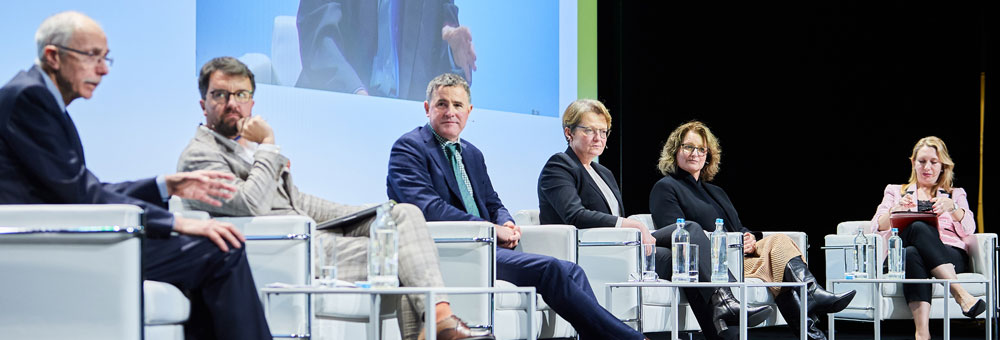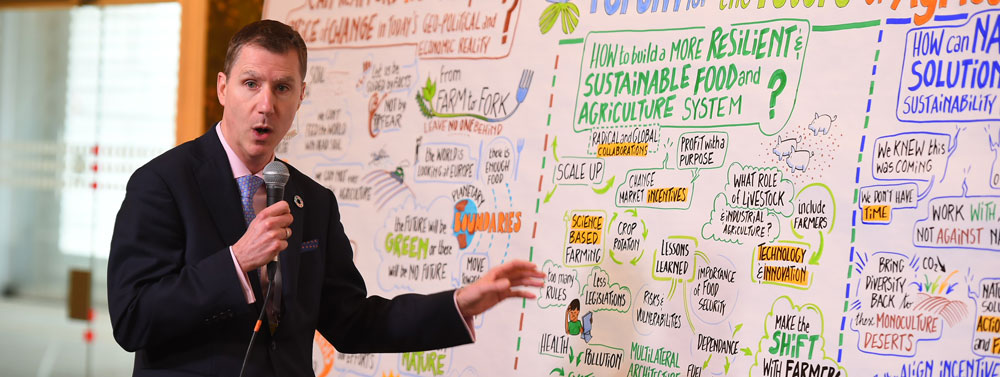2023 Annual Conference summary – Final session
How can we help better: food, migration, climate change?
Friday, Apr 07, 2023
Stefanie Beck, Deputy Minister of Agriculture and Agri-Food Canada (AAFC), joining the Forum online for her opening speech in the final session, shared Canada’s experience in improving sustainable agriculture and food systems across the planet. She noted the country has nearly doubled the value of its agricultural production with almost no increase in greenhouse gas emissions.
Sustainability is at the heart of the new federal, provincial, territorial partnership which will drive over $3.5 billion dollars of investment in the next five years. The government is helping farmers adopt clean technologies and benefit from the latest research into best management practices. More widely, the deputy minister emphasised the need for an open, rules-based global trading regime, consultation and collaboration and “regulatory systems based on science, risk and international standards”.
Opening the panel discussion, Dr. Claudia Sadoff, Executive Managing Director, CGIAR, pointed out “war and conflict have become the most important drivers for food insecurity and migration”. Evidence suggests this will only continue, and hunger and malnutrition continue to rise. The challenges are overwhelming, but not insurmountable. She called for real investment in research and innovation and help to create thriving livelihoods for farmers. With that investment, urgency and partnership, “we can actually achieve an end to world hunger,” she predicted.
Katharina Stenholm, Senior Vice President and Chief Sustainability Officer, PepsiCo Europe, whose presentation was briefly interrupted by a demonstrator, said the company emphasises positive choices. It is aiming to have half a billion healthier snacks on the market by 2025, to inspire people to make the right choices and is working with farmers to transition to regenerative agriculture. She called for collaboration across generations. “If we want to fix tomorrow, today, I really think we need to give the people who are going to live tomorrow a voice today.”
Richard Heath, Executive Director, Australian Farm Institute, underlined that virtually everything Australia grows provides food security for others. The impact of climate change means international trade is vital to respond to short term food shortages. The country focuses on outcomes instead of being prescriptive and “attaching labels to what we should do”. What is needed is reward and incentives for those outcomes, “however they are produced”. He stressed the importance of “the social and governance side of sustainability” to nurture resilient communities and strong regional economies.
Žiga Vavpotič, Director of Partnerships LoginEko, spoke of the efforts two mobile game developers are making to develop a sustainable farm in Serbia. They are using a large team to develop the appropriate software and hope to make this available “to any farming company or farmers around the world for free” in about a year. Alongside their philanthropy, they are consolidating their organic farm and looking to provide solutions for policy makers.
Ted Bilyea, Canadian Agri-Food Policy Institute (CAPI) Distinguished Fellow, spoke of Maple Leaf Foods, which in 2019 became the world’s first major carbon neutral food company by working with farmers and buying high value credits to achieve its goal. Canada’s ability to double food production without increasing emissions was generated by no till farming practices, leading to better water and carbon retention and higher yields. He called for an end to harmful subsidies and urged thinking “about the practical things that need to be done”.
After the panel discussion, Mark Titterington, Senior Advisor, Strategy & Partnerships, Forum for the Future of Agriculture, discussed the Forum’s Call to Action, that had been announced earlier in the day by Janez Potočnik during his opening speech. From a live video link to the foyer, Mark talked participants through the large visual summary that had been created throughout the day by the graphics team to capture the essence of each session. He also highlighted some of the comments received on post-its from delegates on the seven commitments detailed in the Call to Action.
Janez Potočnik then brought the day’s proceedings to a close by urging the next Common Agricultural Policy to be designed around a vision for transition to the needed system change. In addition, “environmental and social transition, leading the way to a more equal world, must go hand in hand, or we will fail”.
You can watch the whole event and exclusive interviews with the speakers on our videos page.




